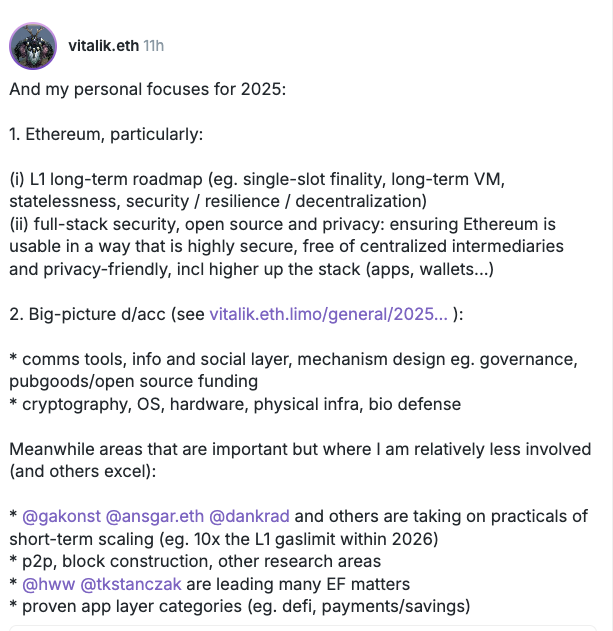Key Insights:
- Vitalik Buterin has released a detailed roadmap for Ethereum’s development in 2025.
- Privacy remains a central focus in Buterin’s plan, with efforts to implement encrypted messaging and privacy-focused tools.
- He aims to strengthen decentralized communication and reduce reliance on centralized intermediaries within the Ethereum ecosystem.
Ethereum co-founder Vitalik Buterin has outlined a detailed roadmap for the network’s development in 2025.
His latest update focuses on privacy, finality, and security improvements across the core protocol and surrounding infrastructure.
The announcement follows a record increase in Ethereum network activity and changes within the Ethereum Foundation.
Vitalik Buterin Prioritizes Privacy in 2025
Vitalik Buterin confirmed that privacy will remain a primary concern for Ethereum throughout 2025. To ensure privacy, the core feature of the ecosystem must include decentralized, secure communication.
Ethereum will add secure communication through encrypted messengers and privacy-enhanced applications to all user tools.

He plans to support improved software documentation and stronger information-sharing practices within the open-source Ethereum community.
He focuses on the Ethereum “social layer,” where governance and coordination improvements are needed. The direction works to decrease the reliance on central authority intermediaries.
Buterin has identified solutions to explore that will advance the privacy capabilities of developers and their end users.
His strategy involves deploying privacy enhancements that were released earlier this year. The objective is to ensure privacy becomes a long-term, sustainable component of the Ethereum protocol.
Ethereum Plans Faster and Safer Transactions
Ethereum’s protocol-level upgrades are also part of Buterin’s focus, especially the push for single-slot finality.
Each block under this design protocol feature would become final within 12 seconds. Due to these project developments, transaction confirmation will achieve both speed and reliability.
Buterin is researching creating single-slot finality technology, which will improve transaction processes while decreasing block validation time.
Such implementation would deliver transformative benefits to the network’s speed and usability performance.
The system upgrade would reduce the chance of network forks and improve blockchain operational reliability at the same time.
Buterin also addressed the future of Ethereum’s state management. He supports the movement towards a stateless model since nodes would no longer maintain complete blockchain state information.
Users of the Ethereum blockchain would need to supply important transaction data for every operation to minimize the processing strain on nodes.
Network Resilience Drives Buterin’s 2025 Vision
Buterin dedicates his attention to implementing protocol system upgrades, cybersecurity protocols, and client resilience initiatives.
A major part of his vision includes backing software development across wallets, nodes, and end-user interfaces.
As user numbers increase, improved tool capabilities will maintain security and decentralization.
Ethereum must resist internal and external threats while enabling secure user experiences. According to Buterin, successful long-term operation requires eliminating system elements with a single possible failure point. Additionally, he is developing tools that deliver network-wide user protection.
Better client software design is among his priorities since it aims to maintain friendly interfaces and privacy protection features.
These changes will align Ethereum with its original goals of being secure, permissionless, and censorship-resistant.
Ethereum Hits 15 Million Weekly Users
The Ethereum network recently reached over 15.4 million unique active addresses per week. This network development benefited largely from Layer-2 protocols, which enabled 13.45 million out of 15.4 million unique addresses.

This milestone coincides with changes at the Ethereum Foundation leadership level. The organization recently liberated Buterin to work primarily on research efforts, according to co-executive director Tomasz Stańczak.
By moving into a new role, Buterin dedicates his time to defining strategic goals and technical advancements.
Buterin has directed his focus more explicitly after maintaining his continuous impact on network development.
His research continues to shape Ethereum’s strategic direction and technical design. The timing of his renewed attention aligns with Ethereum’s expanding usage and broader ecosystem growth.
